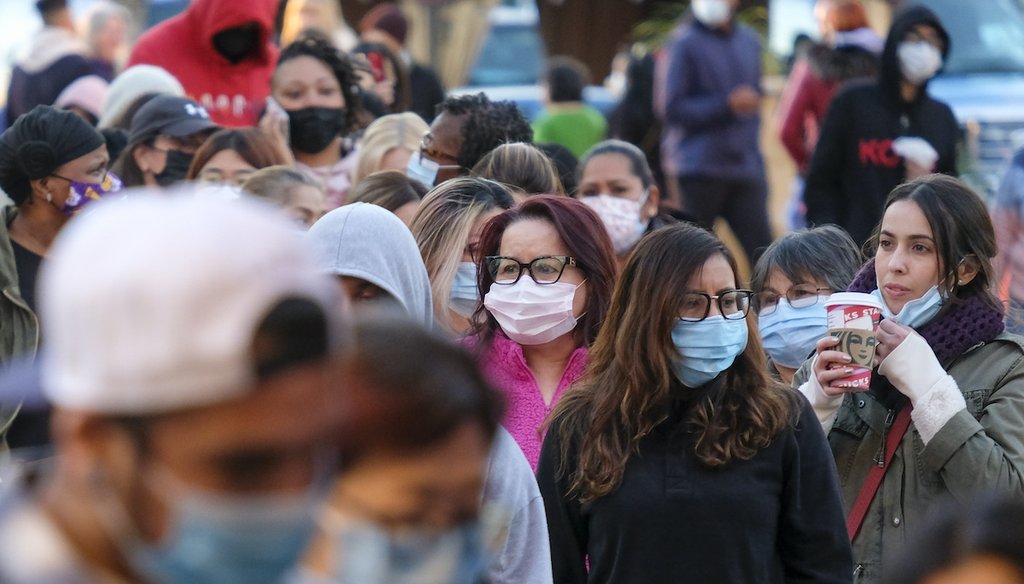Stand up for the facts!
Our only agenda is to publish the truth so you can be an informed participant in democracy.
We need your help.
I would like to contribute

Black Friday shoppers wearing face masks wait to enter a store in Commerce, Calif., Nov. 26, 2021. (AP)
If Your Time is short
-
In a response to a law firm’s Freedom of Information Act request, the CDC said it did not have any documents to provide on unvaccinated people with natural immunity who, upon reinfection, spread the disease to others. That sparked claims that the CDC lacks evidence for its policies that prioritize immunity from vaccination over infection.
-
Those claims misconstrue what the CDC letter actually meant. Due to specific FOIA guidelines and exemptions, the CDC would be unable to provide such documents.
-
Research shows that unvaccinated people with natural immunity can get COVID-19 again. Experts in health and public records explained that there’s a lack of data on whether those unvaccinated reinfected people have spread the virus to others, but this doesn’t mean it doesn’t happen.
Q: Does the CDC lack data on reinfection among people with natural immunity to COVID-19?
A: The CDC does track COVID-19 cases of unvaccinated people who were previously infected and tested positive again. That’s a separate question from a public records request that sought documentation of transmission of COVID-19 by unvaccinated people who are reinfected. The CDC said it does not collect that information.
A PolitiFact reader asked us to weigh in on recent news headlines like this one from Fox News’ "Ingraham Angle: "Why is CDC hiding natural immunity evidence?"
The reader said it would be "astounding" if the Centers for Disease Control and Prevention was really not collecting data on whether newly tested COVID-19 patients previously had COVID-19. So we looked into it.
The CDC does track and record COVID-19 cases of unvaccinated people who were previously infected and tested positive again. The agency issued one such report from Kentucky, where five residents in a skilled nursing facility tested positive for COVID-19 twice within three months. Those cases occurred in 2020, before the first COVID-19 vaccine was authorized for emergency use. The agency released another study from Kentucky in 2021, this one finding that unvaccinated people with prior COVID-19 infection were 2.34 times more likely than vaccinated people to catch the virus again.
But the context of the Fox News segment — and other headlines like it — was about records on transmission of COVID-19 by unvaccinated people who are reinfected.
Some organizations that are skeptical of vaccine requirements called out the CDC for its response to a public-record request involving unvaccinated people who are reinfected. To them, the CDC’s response shows it is developing policies that favor vaccination over so-called natural immunity, without evidence to back them.
But this kind of data collection is complicated for a few reasons.
The public records request and CDC response
This all started when attorneys for the Informed Consent Action Network, an anti-vaccination group based in Texas, filed a federal Freedom of Information Act request for data from the CDC about COVID-19 transmission among reinfected, unvaccinated people on Sept. 2.
The FOIA request asked for "documents reflecting any documented case of an individual who: (1) never received a COVID-19 vaccine; (2) was infected with COVID-19 once, recovered, and then later became infected again; (3) transmitted SARS-CoV-2 to another person when reinfected."
The CDC replied in a Nov. 5 letter that the agency did not have any records pertaining to the request. "The CDC Emergency Operation Center (EOC) conveyed that this information is not collected," the CDC wrote.
Aaron Siri, the managing partner of law firm Siri & Glimstad, which represents the Informed Consent Action Network, reacted to the agency’s response in a blog post:
"You would assume that if the CDC was going to crush the civil and individual rights of those with natural immunity by having them expelled from school, fired from their jobs, separated from the military, and worse, the CDC would have proof of at least one instance of an unvaccinated, naturally immune individual transmitting the COVID-19 virus to another individual."
Does the CDC’s response to the record request mean that there’s no evidence of unvaccinated, previously infected people transmitting COVID-19? On its own, no.
CDC research shows that unvaccinated people with natural immunity can get COVID-19 again. But experts in health and public records explained that there’s a lack of data about whether those unvaccinated reinfected people can or have spread the virus to others. That lack of data doesn’t mean that it doesn’t happen, they clarified.
In addition, they explained, the CDC would be unable to provide these kinds of documents due to specific federal FOIA guidelines.
How FOIA works
FOIA is a federal law that gives the public the right to request certain records from federal agencies, like the CDC. Anyone can make a FOIA request. Once the agency receives the request, it is required to send a response letter explaining whether those records were located.
By law, federal agencies have to disclose the information that is requested unless it falls under one of nine exemptions, which include protections for national security, individual privacy and trade secrets. FOIA does not apply to records held by Congress, the courts, or state and local government agencies.
David Schultz, professor of political science and legal studies at Hamline University in Minnesota, told us that because the data the CDC collects about reinfection cases comes from the state and local levels, it wouldn’t fall under FOIA guidelines.
"If there are any statistics that are going to be gathered about infections, who’s infected, etc. etc., that’s going to happen at the state level and generally governed under state law," Schultz said. "At that point, the states would be transmitting their data to the CDC. So at best what the CDC would probably have would be any state information they’re gathering from all 50 states."
The law firm’s request asked specifically for "any documented case of an individual" who wasn’t vaccinated, had prior infection of COVID-19, got sick again, and passed it on to someone else.
The CDC "might be gathering information about how many infections (there are) for COVID," based on general testing, Schultz said. "And there might even be some information regarding reinfection rates. But all that’s going to be hugely redacted or anonymized at the state level."
CDC spokesperson Scott Pauley confirmed this, telling PolitiFact that the agency does not maintain individual case files and wouldn’t be able to provide that kind of information. The CDC does have public reports on anonymous patients who have been reinfected, but those reports don’t specifically cover the onward transmission of COVID-19 from reinfected individuals.
"At this time, CDC has not published any reports on the transmission rates for unvaccinated persons who have been reinfected with COVID-19, although there is no reason to believe that reinfected persons do not transmit the disease," Pauley said.
The CDC released a study on Oct. 29 of COVID-19 reinfection rates among 7,000 people across nine states, some vaccinated and some unvaccinated. The agency found that unvaccinated people with a prior infection were over five times more likely than vaccinated people to catch COVID-19. Another study found that unvaccinated people with prior infection were over 10 times more likely to be hospitalized or die from COVID-19.
Research adds context
Tracking virus retransmission by either vaccinated or unvaccinated people is difficult, said Dr. David Hamer, Boston University professor of global health and medicine.
However, based on what is already known about the disease, Hamer said, it’s highly likely that anyone who has a high viral load of COVID-19 could transmit the virus to someone else.
PolitiFact has previously fact-checked several claims about natural immunity against COVID-19 and found that it does give substantial protection against reinfection. But as with a COVID-19 vaccine, protection from natural immunity decreases over time. And unlike vaccination, natural immunity necessarily involves a COVID-19 infection, which comes with a gamut of high risks. Health experts say it is safer to get vaccinated than to rely on natural immunity.
Critics of vaccine requirements argue that they fail to account for people who have natural immunity. Preliminary studies from Israel and the U.S. show that people who survived COVID-19 were left with robust immunity. However, some of that research also showed that giving a single vaccine dose to those who had recovered from COVID-19 boosted their immunity and gave them the best protection.
PolitiFact researcher Caryn Baird contributed to this report.
Our Sources
Informed Consent Action Network Website, accessed Nov. 19, 2021
Business Insider, How a New York billionaire-funded anti-vax group is contributing to the vaccine hesitancy that's crippling the US recovery, Aug. 24, 2021
Siri and Glimstad LLP, Freedom of Information Act Request, Sept. 2, 2021
Twitter post, Nov. 11, 2021
The Gateway Pundit, CDC Admits It Has No Record of an Unvaccinated Person Spreading Covid After Recovering From Covid, Nov. 11, 2021
The Epoch Times, CDC: No Record of Naturally Immune Transmitting COVID-19, Nov. 13, 2021
Injecting Freedom, CDC Admits Crushing Rights of Naturally Immune Without Proof They Transmit the Virus, Nov. 11, 2021
FOIA.gov, accessed Nov. 17, 2021
FOIAonline.gov, Make a FOIA Request, accessed Nov. 17, 2021
Phone interview with David Schultz, professor of political science and legal studies at Hamline University, Nov. 17, 2021
Email interview with CDC spokesperson Scott Pauley, Nov. 17, 2021
Centers for Disease Control and Prevention, Morbidity and Mortality Weekly Report, Feb. 26, 2021
Centers for Disease Control and Prevention, Morbidity and Mortality Weekly Report, Aug. 13, 2021
Centers for Disease Control and Prevention, New CDC Study: Vaccination Offers Higher Protection than Previous COVID-19 Infection
Centers for Disease Control and Prevention, Morbidity and Mortality Weekly Report (MMWR), Sept. 17, 2021
PolitiFact, Nearly half US might have ‘natural immunity’ from COVID-19, but infection brings high risks, Oct. 12, 2021
MedRxiv, Comparing SARS-CoV-2 natural immunity to vaccine-induced immunity: reinfections versus breakthrough infections, Aug. 25, 2021
Email interview with Elizabeth Brehm, attorney at Siri and Glimstad LLP, Nov. 18, 2021
Phone interview with David Hamer, professor of global health and medicine at the Boston University School of Public Health and School of Medicine

























